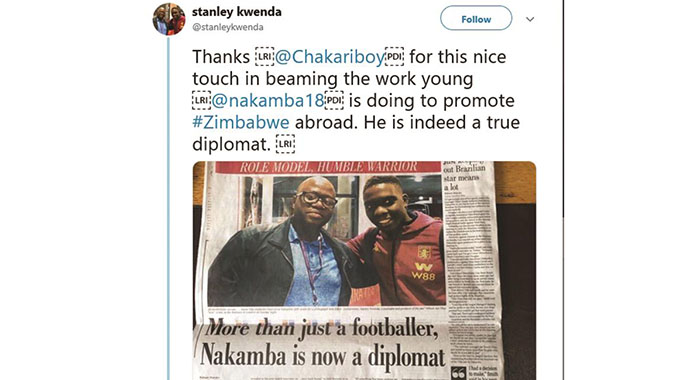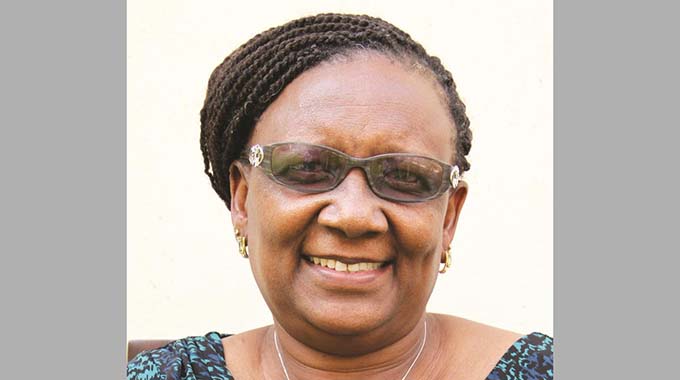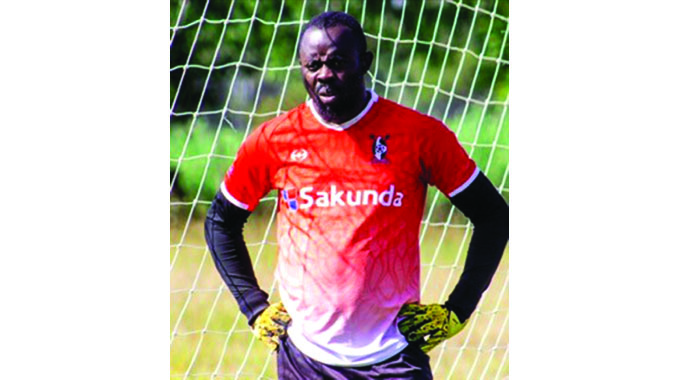First, the dogs and cats disappeared, then the birds, all eaten in desperation, but amid all this, football survived

Robson Sharuko on Saturday
I meant to go ballistic today, angered by a lot of things I saw at the FIFA awards ceremony on Monday night, which, in the heat of the moment, appeared like a celebration of shame.
My anger having been fuelled by what I considered to be an unfair and outrageous snub of Alvin “Aluvah’’ Zhakata in the FIFA Fan Award.
His absence, even among a shortlist of three candidates for the gong after his landmark Cape to Cairo AFCON adventure appeared to me an insult to his sacrifice.
Wondering how the sights and sounds of some rich Dutch fans at this year’s Women World Cup finals in France could be considered more special than an eight-country 10 000km hitch-hiking adventure by a poor African fan, just to watch the Nations Cup finals?
Asking myself how Sadio Mane, with all that he did for Liverpool, scoring a Golden Boot, winning 22 league goals and helping them win the UEFA Champions League final, could somehow be ignored from the shortlist of the three best players for the FIFA award?
And, even more bizarrely, if not frustratingly, not being named in the Best XI squad?
Wondering how a historic English Premiership season in which three African players — Mane, Mohamed Salah and Pierre-Emerick Aubameyang — shared the Golden Boot with 22 goals apiece, could not be rewarded by one of them making the Best XI squad?
Asking myself how Sergio Ramos, who captained a Real Madrid side that conceded 46 league goals in 38 matches, finished 21 points behind Barcelona, were knocked out of the Champions League quarter-finals, could be deemed to have done better than Joel Matip, the Cameroonian defender who was at the heart of the Liverpool defence that conceded just 22 goals in 38 league matches and won the Champions League?
Wondering how a Premiership that produced finalists in the Champions League (Liverpool and Tottenham) and in the Europa League (Arsenal and Chelsea) could only produce three players — Alisson Becker, Virgil Van Dijk and Eden Hazard — in the Best XI?
The same number as Real Madrid, who also provided Marcelo and Luka Modric in the Best XI squad despite their appalling mediocrity last season?
And how none of the amazing Tottenham players, whose heroics swept their team into Champions League final, could not get a place in that team?
Mane (22 goals in 36 league matches; four Champions League goals in 13 games); Salah (22 goals in 38 league games; five Champions League goals in 12 games) and Harry Kane (17 goals in just 28 league matches; five Champions League goals in nine matches), such amazing statistics?
No reward?
Of course, I would have gone for Van Dijk for the top gong because I always feel defenders are not given the respect and recognition they deserve. But, I won’t go ballistic today because on Tuesday, Wednesday, Thursday and yesterday, I sobered a lot.
And, I realised those who decided Brazilian mother Silvia Greeco deserved the Fan of the Year award — for what she has been doing to help her blind son follow his favourite team — probably were right.
And, those who voted for Messi as the best player in the world in the past year, were also probably right.
MESSI IS FORTUNATE, HE LIVES IN THE REAL WORLD WHERE THEY CELEBRATE HIS GREATNESS
At least, guys like Messi have people who appreciate what they do, sing in their corner, and would rather talk about the beauty of their talent rather than any negativity that crops up.
And, they revel in his exploits, feed it to the globe, argue his case and don’t live in a world where the password is negative:
“Knowing that Lionel Messi is the best player in the world comes with just one condition — having eyes and using them to watch football,’’ wrote football writer, Andrew West this week.
“Messi problem and the only reason the ‘deserving’ winner of awards like this is even discussed is that we take him for granted.’’
In sharp contrast, we remain a nation allergic to the beautiful and amazing stories that come out of our borders, for one reason or another.
A community trapped in a quagmire of negativity, we would rather spend the week feasting on rumours Madinda Ndlovu is dead, rather than spreading the message he is recovering well in hospital.
A people who would rather spend the week discussing on social media groups the moment Marvelous Nakamba was left sprawling on the ground by his Arsenal opponent, rather than the crucial interventions he made to stop the Gunners in their backyard.
A people who would rather read about Percy Tau scoring for Club Brugge, rather than about Nakamba doing well in the English Premiership for Aston Villa. Even after the Warriors star dumped that very Belgian team, and league, where the Bafana Bafana forward is now playing, after outgrowing both of them.
A people who would rather spend weeks mocking a photograph of Henry Chari and Stanley Chirambadare because it suits our negative instincts and agenda.
And it feeds into our stereotype that virtually all local footballers end up in some kind of mess, instead of discussing Norman Mapeza’s beautiful house in Glen Lorne, because that will prove that narrative is false.
Or, even, appreciating the strides players like Gabriel Nyoni, Maxwell Nyamupadengu and Martin Vengesayi have taken in completing their academic degrees.
A people who bombarded Aluvah with all sorts of negative messages, especially when he faced the frustrations of not getting a visa to enter Ethiopia, with many even telling him he was a suicidal fool.
Because, if we really cared and celebrate our beautiful and amazing stories, Etias Machekeche’s tale — his love for Highlanders despite his visual impairment — would, just like Grecco’s tale, have been appreciated by the world.
And, possibly, won him a FIFA Fan Award before the Brazilian.
Maybe, the world would also have joined us in celebrating the amazing life of Obert Sithole of Zvishavane, who defied blindness caused by a mine accident to become a football correspondent for local radio station Star FM.
FORGET THE CONTROVERSY AND JUST CELEBRATE THIS GAME’S BEAUTY
Somehow, we are a people who would rather spend the next year debating why Messi won the award and VVD didn’t, rather than spend weeks celebrating the powerful performance of one of our own in Paris on Wednesday night.
The incredible story that has seen Marshall Munetsi, who not so long ago was playing on the dusty fields of Mabvuku for Desmond “Dezola’’ Ali’s academy, producing a man-of-the match performance at the Parc des Princes on Wednesday.
Yes, overshadowing an entire PSG side with Neymar, Di Maria, Herrera, Bernat, and helping his side Stade Reims to a 2-0 win with the gritty Warrior being named the best player on display.
Munetsi’s amazing tale is yet another fine example of defiance, the refusal to accept his fate, the relentless passion to pursue his dreams, the steely ambitions to conquer the odds and the discipline to remain focused.
And, you got to love football, which is why I do, because it’s the only game that can provide such a beautiful rainbow, such powerful stories, a game strong enough to have silenced those guns in No-Man’s Land during World War 1 on Christmas Eve in 1914.
This year marks 105 years since those German soldiers and Allied fighters temporarily put their weapons down, exchanged beers and cigarettes and played a football match.
This year also marks the 75th anniversary of the End of the Siege — the 872 days in which the residents of the Russian city of St Petersburg, then known as Leningrad, spent in hell, surrounded by German and Finnish forces during World War II.
By the time the siege ended on January 27 1944, disease, starvation and exposure had reduced the city’s population from 2,5 million to about 800 000. I have been watching a number of documentaries about that siege, celebrating the heroics of the city that refused to starve, and some of the stories from the diaries of those who lived through the nightmare, make chilling reading.
“People now die in a very simple manner,’’ wrote one of the residents.
“At first, they lose interest in everything and then they lie in bed, never to rise again.
“They die as if they are falling asleep and the surrounding people, half dead themselves, pay them no attention.
“Death has become a phenomenon, observed at every turn, when you step outside in the morning, you stumble over the corpses lying in the gateway and on the streets.
“The dead bodies lie there for a long time because there is nobody to dispose of them.’’
For me, the most graphic story about those events was published recently by DW News, the global English language news and information channel of German international broadcaster Deutsche Wetsche.
“At first, the dogs and cats disappeared. Then there were no birds anymore. They were eaten.
“It was done out of pure desperation, in order to survive and not go crazy,’’ DW News reported.
“The menu in Leningrad during this period of the war included wallpaper, window putty and soup made of boiled leather.
“A survivor, the Russian author Daniil Granin, described the almost unthinkable: ‘a child died, he was just three years old, his mother laid the body inside the double-glazed window and sliced off a piece of him every day to feed her second child, a daughter. This is how she got her, though.”
Remarkably, amid all this, 75 years ago, football provided this city with a reason to cheer its battered spirits.
Local club, Zenit St Petersburg, then known as Zenit Leningrad, despite having lost half of their 20-man squad to death in combat defending their town, went to Moscow and beat the capital’s three main teams to win the USSR Cup.
A city decimated by the horror of war, with a third of its population wiped out, was somehow able to celebrate the amazing triumph of its football club.
Seventy five years later, the people of St Petersburg have never forgotten that miracle when — amid the ruins, death and war — the amazing power of football gave them a reason to smile, celebrate and believe in life once again.
Sadly, for us, just three days after Munetsi’s “Miracle in Paris”, we have already forgotten about it.
Because we would have preferred he had failed or we are more comfortable arguing Mane and Salah were robbed in the FIFA awards rather than celebrate the heroics of one of our own.
Maybe, after all, I was right not to go ballistic today.
To God Be The Glory!
Peace to the GEPA Chief, the Big Fish, George Norton and all the Chakariboys in the struggle.
Come on United!!!!!!!!!!!!!!!!!!!!!!!!!
Ole, Ole, Ole, Ole, Ole, Ole, Ole Ole!
Text Feedback — 0772545199
WhatsApp — 0772545199
Email — [email protected] [email protected] You can also interact with me on Twitter — @Chakariboy, Facebook, Instagram — sharukor and every Wednesday night, at 10pm, when I join the legendary Charles “CNN’’ Mabika and producer Craig “Master Craig’’ Katsande on the ZBC television magazine programme, “Game Plan”








Comments